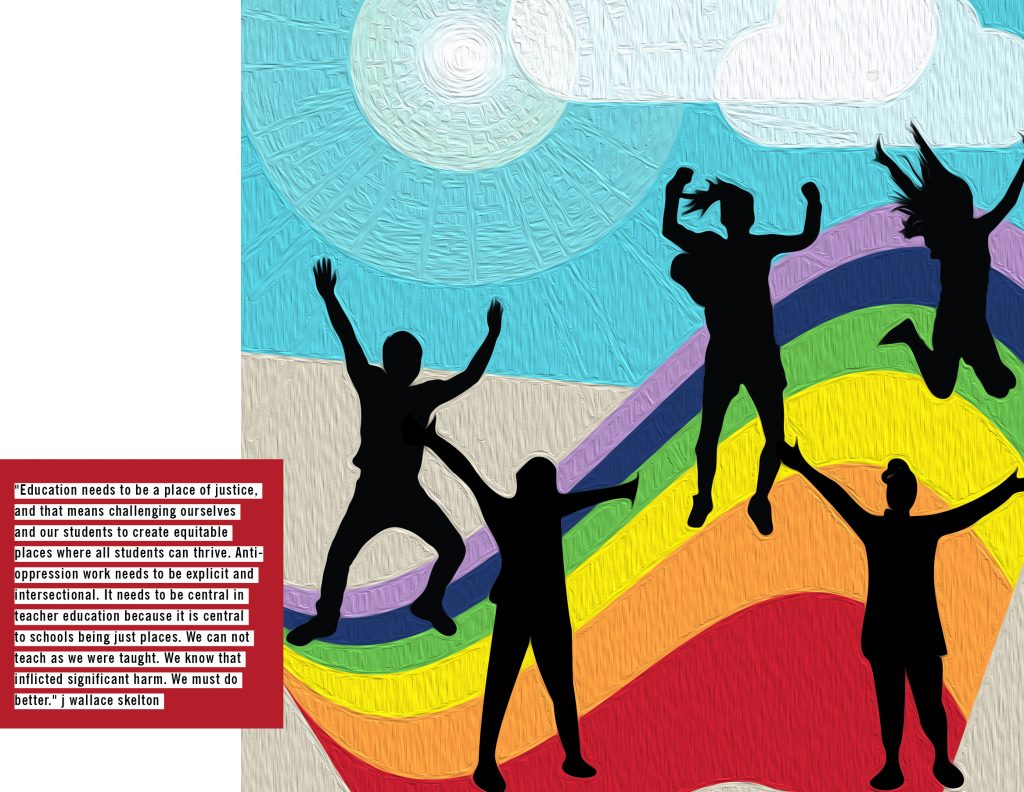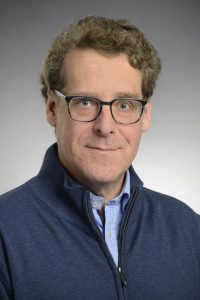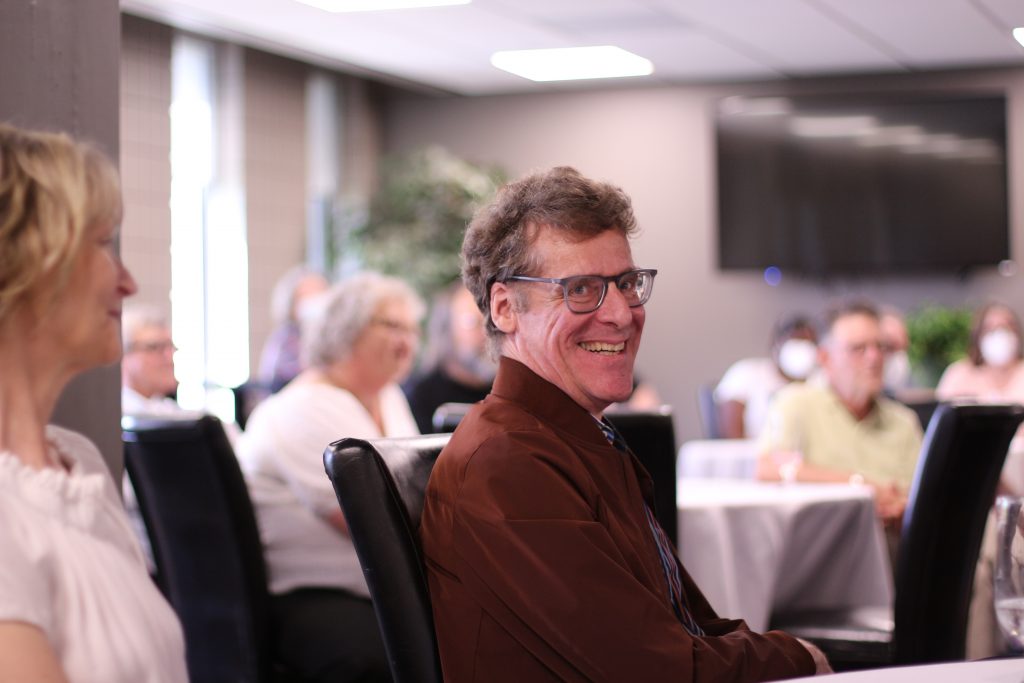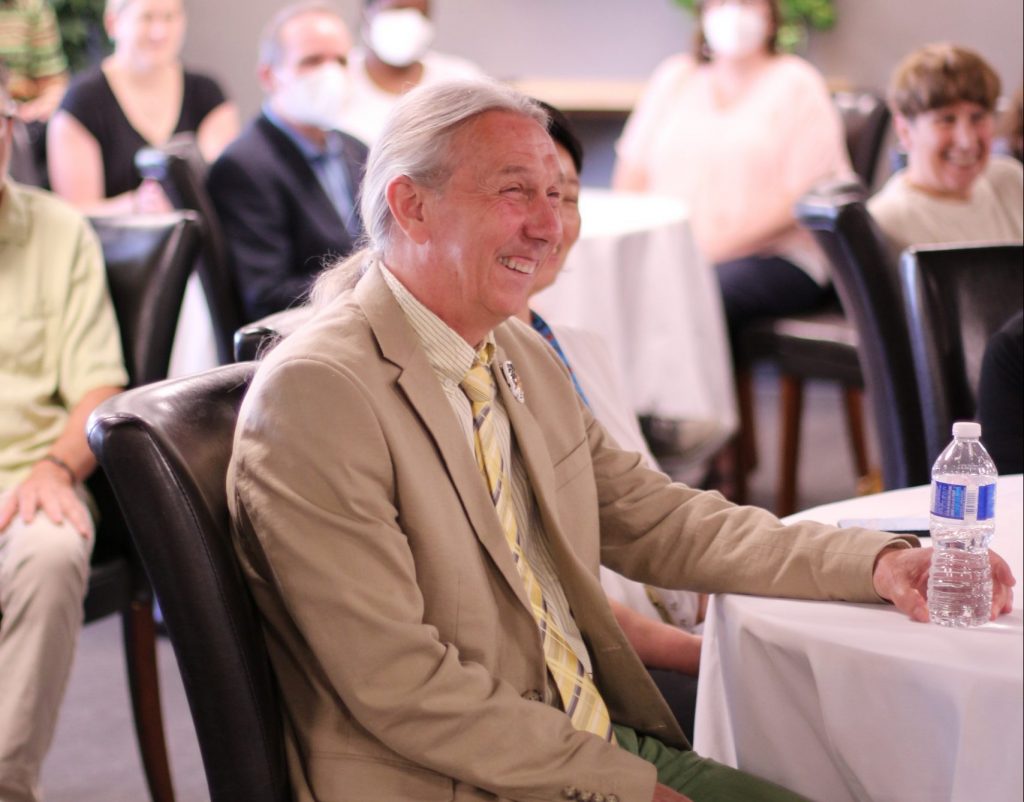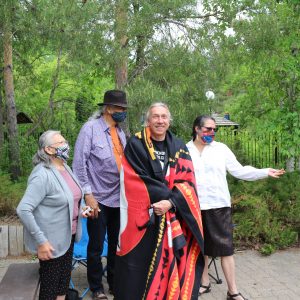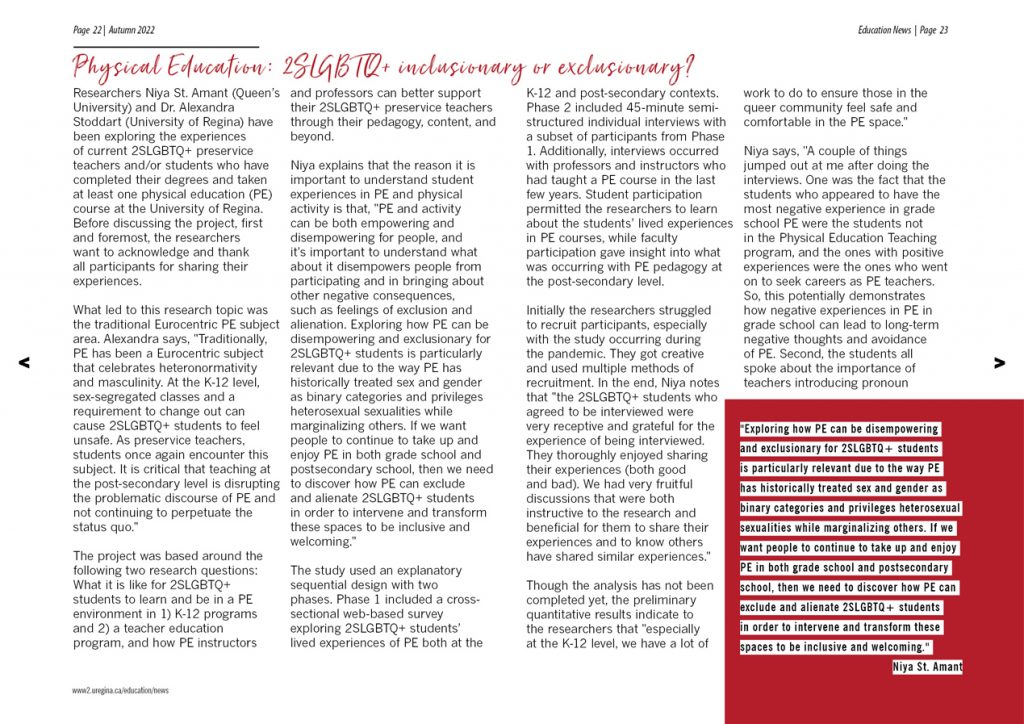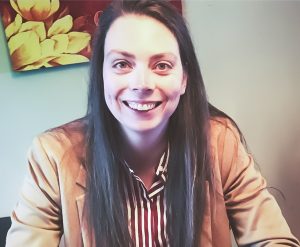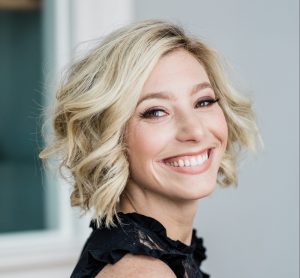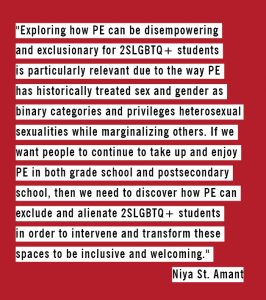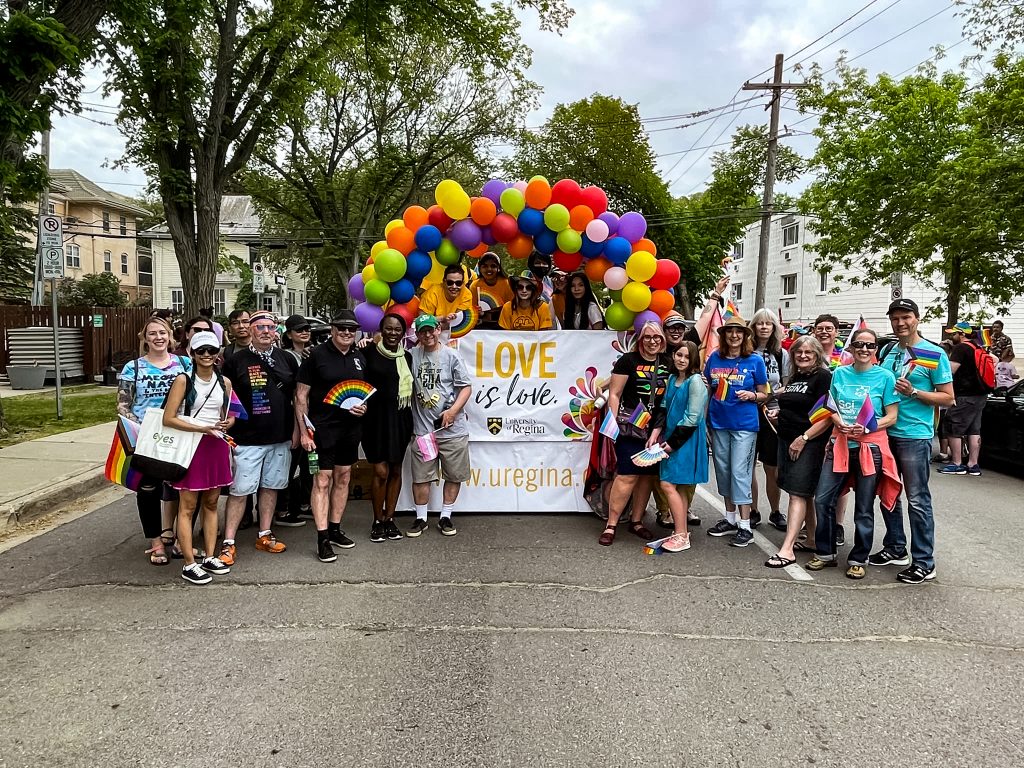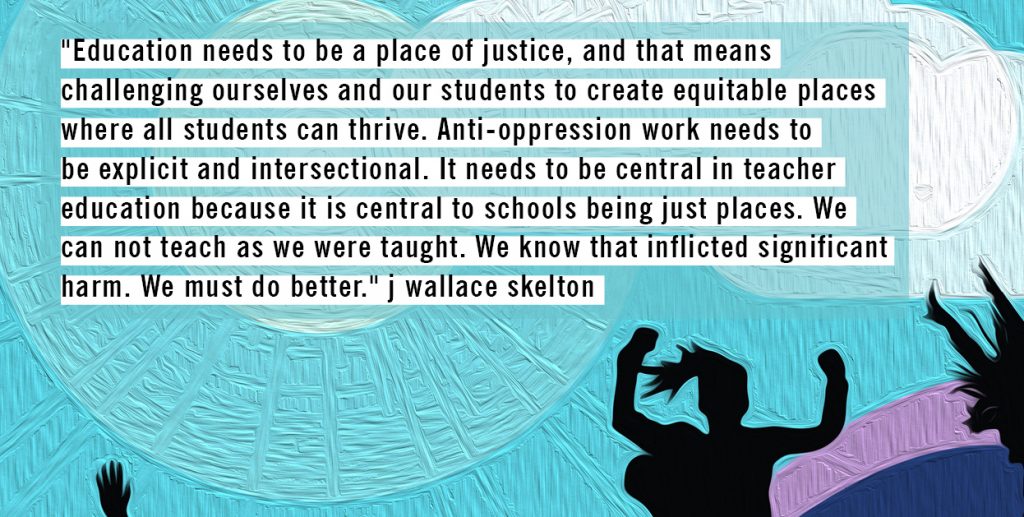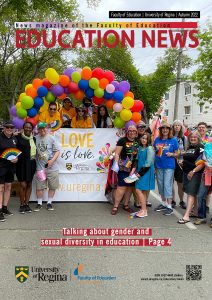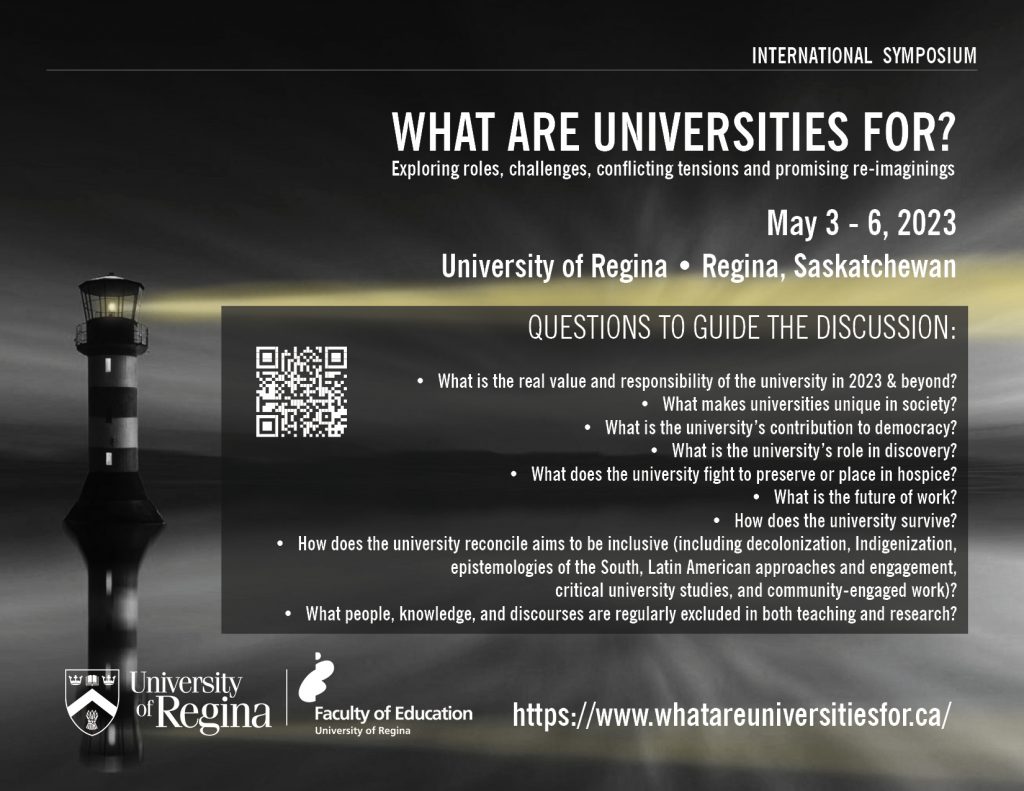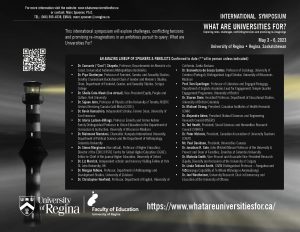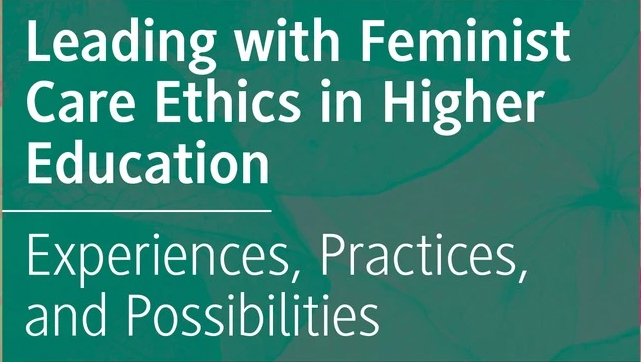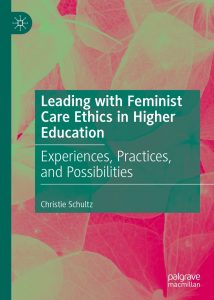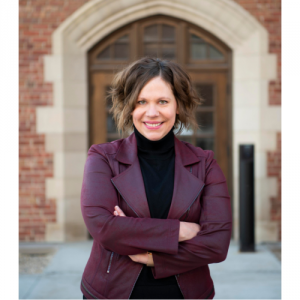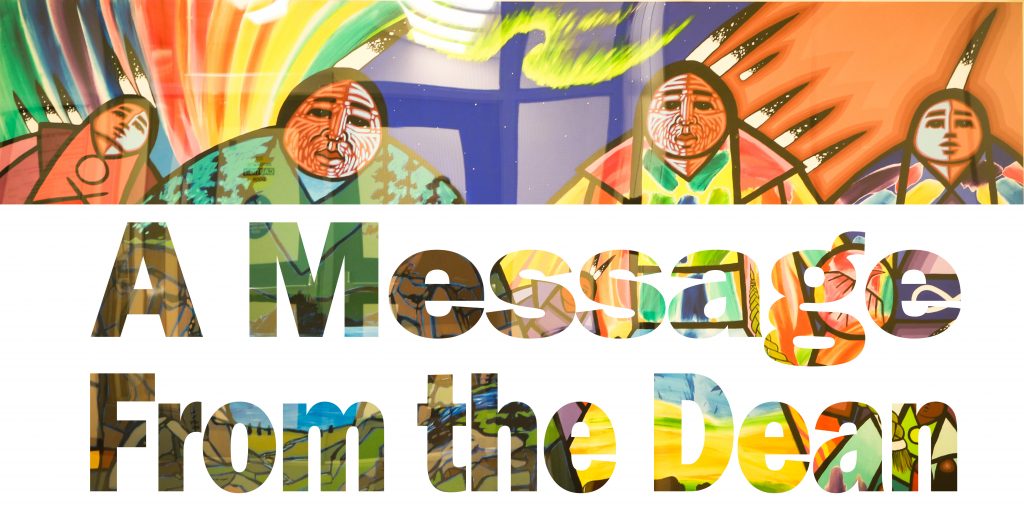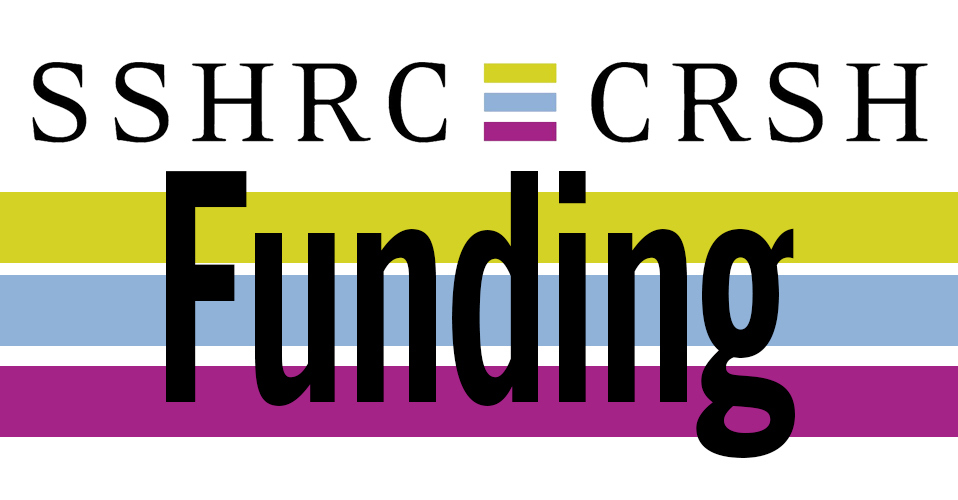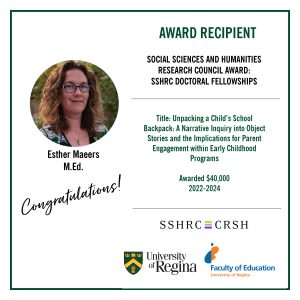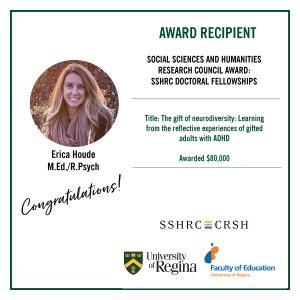As part of our Faculty’s efforts to further develop a critical consciousness of, and stand in solidarity with, those who have been marginalized by gender and sexual diversity (GSD) in the field of education and higher education, in this article a diverse group of panelists—queer, trans, nonbinary, and cis het—all devoted to the work and research of GSD, talk about about the current challenges; personal and professional experiences that have motivated them to do GSD work; and how universities, faculties, professors, school divisions, and teachers can better support those marginalized by gender and sexual diversity.
Meet the Speakers

Jacq Brasseur (BSW’13, RSW’15, MEd’21) is the CEO and Principal Consultant at Ivy + Dean Consulting, a firm they founded to “bring social justice and equity into the non-profit boardroom.” In this role, they provide Professional Development (PD) for teachers and schools for improving 2SLGBTQ+ competency. Most recently, Jacq has been focusing on working with faith-based schools in Saskatchewan, with various Catholic districts as well as some private schools. As a proud member of the Regina Catholic School’s GSD Committee, Jacq is working with the district, as they endeavour to support 2SLGBTQ+ kids.
“While I have found this work challenging, I have also found it incredibly rewarding—there are queer and trans students (and teachers!) in Christian and Catholic schools in Saskatchewan, and they deserve to feel supported and affirmed in their whole selves,” says Jacq.
When Jacq moved to Regina in 2017, they took on the role of Executive Director for the UR Pride Centre. Among many other responsibilities, this role involved providing PD training for teachers and educators in Southern Saskatchewan schools. They also oversaw the transition of Camp fYrefly and fYrefly in Schools programs from the University of Regina to the UR Pride Centre. (Read about their Distinguished Alumni Award for Humanitarian and Community Service Award.)
Before moving to Regina, Jacq lived in Yellowknife, NT, where they co-founded what is now the Northern Mosaic Network, a 2SLGBTQ+ human service agency in Yellowknife, NT. Jacq worked closely with NT schools, educators, and the Ministry of Education to create more inclusive spaces.
Kyla Christiansen (BEd’91, MEd’14) is currently the Coordinator of Comprehensive School Community Health for Good Spirit School Division and Coordinator of Mental Health and Diversity for Regina Public Schools. Kyla has also served in many roles throughout her career, such as high school administrator, provincial school coordinator for fYrefly, Saskatchewan, GSA Summit coordinator, sessional lecturer for the Faculty of Education, and gender and sexual diversity consultant for five Saskatchewan School Divisions.
Dr. James McNinch (professor emeritus) is currently a consultant with the Saskatchewan School Board Association on a project about parent/teacher home visits. He is also conducting PD for Prairie Spirit School Division administrators and board members in the area of gender and sexual diversity.
During his 20-year career with the Faculty of Education, James served in a variety of roles: dean, associate dean, director of the Professional Development and Field Experiences office, director of the Teaching Development Centre, and Director of SIDRU (the Faculty’s research unit), as well as professor of professional studies. Particularly memorable was the anthology James co-edited and contributed to, entitled, I Could Not Speak My Heart: Education and Social Justice for Gay and Lesbian Youth (2004). Also that year, James created and taught a course on school and sexual (and gender) identities (EFDN 306). “This course continues to be an elective and has hopefully been updated to keep up with this dynamic field of teaching, learning, and research,” says James.
Camp fYrefly, a 4-day annual retreat that welcomes teens and young adults who identify as 2SLGBTQA+, has been an important part of James’ work over the years. As dean, he used his influence to help bring Camp fYrefly to Saskatchewan. James was program co-ordinator for Camp fYrefly and the fYrefly in Schools programs from 2016-2018 and he is still helping with fYrefly: “This year the camp returned to Regina as a live event after being online for the past 2 COVID-19 years. There were 57 campers and more than half of them self-identified as being gender fluid or non-binary. This is further proof that gender as a marker of identity is beginning to fade. It has already been 5 1/2 years since Parliament passed a bill (first proposed in 2005!!) protecting the rights of transgender and other gender diverse individuals,” says James.
Dr. Fritz Pino is an assistant professor in the Faculty of Social Work. Fritz says her “research and community work have always been centred on exploring the experiences of queer and trans communities, specifically queer and trans sexualities and identities that intersect with race, age, class, and migration.” All of Fritz’s current projects are also centred on queer and trans lives. A few examples include the following: Fritz is conducting interviews to document the lived experiences of queer and trans Filipino immigrants to assess how being a racialized queer or trans intersects with migration and settlement in the prairies. Another project involves exploring the concept of social support of 2SLGBTQ+ faculty and staff at the University of Regina to contribute to the development of EDI related programs. Fritz is working on a manuscript about global transfeminisms, and the experiences of Filipino trans women during COVID-19 pandemic. She is also developing a graduate level course called Critical Social Work Practice with 2SLGBTQ+ communities, to be taught Winter 2024 with the Faculty of Social Work. Another area of her research involves 2SLGBTQ+ poverty and healthcare services.
Dr. Christie Schultz is currently the dean of the Centre for Continuing Education and an associate professor in the Faculty of Education. Since the early 2000s, Christie has participated in panel conversations, primarily in university classrooms, that have focused on gender and sexual diversity. In her work as a professional and an academic serving in a leadership role at the University, Christie works on being visible. “I think it is important to be who I am at work, to be a positive example of an out queer woman, especially for the next generation of scholars and leaders in higher education,” she says.
Dr. j wallace skelton is an assistant professor in queer studies in education. j has been addressing matters of sexual orientation and gender identity for 20 years, though as a queer and trans person, j has been engaging in systems of education for much longer. j’s work has included supporting and training students and staff teams, policy writing, research, piloting a high school gender course, conference organizing, planning for organizational change, mentoring teachers, running groups for trans and nonbinary children, human rights investigations, and assessing external partnerships.
j’s master’s thesis examined trans and nonbinary characters in children’s picture books. The findings led j to launch a press to publish the books that j and j’s husband wanted to see. With the understanding of the importance of listening to children and believing them, j’s PhD research invited gender independent and trans, nonbinary (GIaNT) children to show and tell what learning would be like if they were able to create it.
As a new faculty member, j says, “I’m currently very engaged in thinking about what it might mean for us to be a Faculty that celebrates sexual and gender diversity, and how to do that. There is a lot of faculty support for this, and I’m doing it with others, and it feels like an exciting place of possibility. We’ve not provided the support people need; we’ve not embedded 2SLGBTQA+ content across our curriculum, but we can, and we need to.”
What experiences brought you to the work and research of gender and sexual diversity? What was the need you were seeing or experiencing?
Fritz: I identify as trans woman of colour, born and raised in the Philippines. My work is connected and informed by my embodied social location and subject position. There is still a great need to increase trans literacy, and to develop scholarly, pedagogic, and policy interventions that address queer and trans issues of marginalization, invisibility/hypervisibility, oppression, and discrimination.
Christie: When I was an undergraduate student, seeing and learning from queer professors who I could admire made a big difference in my young adult life. Because of these professors, I could begin to imagine myself as both queer and professional—and professional in queer ways. (I know this wouldn’t have been important for everyone, but it was important to me in my young adult life.) In very subtle ways, they taught me I could be hopeful and I could be myself.
Kyla: As a rural school educator and administrator, I witnessed the impact of heternormativity, homophobia, and transphobia on individual students and my school community as a whole. Early in my career, I met people in both personal and professional capacities whose lived experiences were quite different from my own, and I realized just how extremely privileged I was because of “who I was and who I loved.” It became obvious to me that the moral and ethical imperative was to create spaces where my students (and staff) felt protected, respected, and included. In my educational career, I also worked for the provincial government. During that time, it became more about the “politicizing” of identities and I determined to become more involved in advocacy work. When I engaged in graduate work at the U of R, my commitment and passion for this work deepened, and I have been doing what I call “behind the scenes” advocacy work since—to create safer spaces where students and families voices can be heard.
James: As a man who came out later in life with the realization of my own sexual orientation and attraction to men, my journey out of the closet was an intense and sometimes painful process and it made me appreciate larger issues of diversity, equity, and inclusion. I was working with SUNTEP and the Gabriel Dumont Institute at the time and the struggles of the Métis, their unique history of marginalization, their ability to “see with both eyes,” and “to live in two worlds” and to act as intermediaries and go-betweens between two racialized solitudes, all of this was a huge inspiration to me. It made my “issues” seem trivial in comparison.
Jacq: I came out to my family and classmates when I was 11 years old—over 20 years ago, when children that young weren’t really as open as they are now. I lived and learned in a Catholic education context, and this significantly impacted the way that I experienced school as an openly queer kid.
I think I was really lucky to have progressive Catholic educators as parents. Both of my parents are established Catholic educators in the Northwest Territories, and they protected me unconditionally within my school system, and they were positioned to do so as educators and administrators who worked within it. I definitely experienced some homophobia from my classmates and teachers, but I think I was shielded from a lot of it because of who my parents were. I know other queer kids in Catholic schools aren’t that lucky.
Still, when I was in Grade 5, I approached my elementary school principal and asked if I could plan something in school for May 17, the International Day Against Homophobia, Biphobia & Transphobia. She said “no.” I walked out of her office thinking to myself: “You will rue the day that you told me I couldn’t do this!” Ever since then, I have had a strong commitment and motivation to work on improving learning spaces for 2SLGBTQ+ kids and teachers.
More recently, when I took my Master’s of Education at the University of Regina where I focused on queering curriculum and community-based curriculum development, I was in an early childhood education course where I heard my colleagues (most of whom were licensed and practicing teachers in Saskatchewan!) share anti-gay and anti-trans dogwhistles about queer and trans children. I was amazed at how many really competent teachers were spouting off talking points that I thought everybody understood were violent and obviously harmful towards 2SLGBTQ+ communities. This has led me to develop a stronger interest in queering children’s literature and queering early childhood education; however, I’m definitely not an expert yet!
j wallace skelton: GSD work and research is about me, my family, my children, my communities, and other 2SLGBTQA+ people who do not get the love, welcome, language, and celebration they deserve. For me, this question is like saying “Why do you work for justice for yourself and everyone you know?”
I was out as a queer person in 1990. By 1995, I was an official delegate for the International Lesbian and Gay Association (ILGA) to the UN’s Fourth World Conference on Women in Beijing. I was lobbying with people like Palesa Beverly Ditsie and Dylan Scholinski. Palesa Beverly Ditsie is a South African activist whose work included ensuring that The Republic of South Africa’s constitution prohibited discrimination against on the grounds of sexual orientation. Dylan Scholinski is a trans person who spent his high school years in psychiatric hospitals undergoing conversion therapy, and who then became an activist against conversion therapy. I was deeply inspired by them both. Dylan and I almost got arrested, along with others, for supporting Palesa during her speech to the UN about the importance of supporting human rights of people of all sexual orientations. We were being taken down a long hallway by Chinese security, when Bella Abzug intervened by blocking the hallway with her wheelchair. Her aide got on the phone to the US State Department and Bella refused to move until they released us. It was a stunning moment of solidarity work.
Making queer and trans lives possible is about all of us engaging in community care. I am constantly inspired by people who do the ongoing work of making more possibility for themselves and others. It’s a giant group project and we inspire and support each other in it.
What successes, failures, or changes have you seen over the years in the work of gender and sexual diversity in education?
Fritz: My work has not necessarily changed over the years. However, I continue to engage in local or spaced-based research, community organizing, and advocacy. I believe that queer and trans issues are shaped and impacted by the politics and social structures of local settings.
The change I have seen, at least in the context of my work, is that the momentum of advocating for queer and trans lives has been magnified/increased. This is also based on my observation that queer and trans experiences of oppression and discrimination continue to manifest in varying levels, sometimes quite subtly within institutions and organizations.
j wallace skelton: I often remind cis het folks that we are still reasserting our own identities, and taking back our ability to name ourselves. Taking it back from medical establishments that want to pathologize us, taking it back from legal establishments that want to criminalize us. Black people, Indigenous people, and people of colour continually have to assert their identities, value, being in the face of white supremacy and colonialism. Work I did a decade ago, that I felt great about then, now feels inadequate, and this work has to be constantly revisited and made better.
Fred Moten (2016), a Black thinker and philosopher I feel inspired by, when asked about the work of Black people said, “I love all the beautiful stuff we’ve made under constraint, but I’m pretty sure I would love all the beautiful things we’d make out from under constraint better.” Similarly, I think our culture has not yet seen what 2SLGBTQA+ people would do if we got to experience love and freedom. I want to get to see that. This drives my work.
It’s hard to write about successes at a time of push back and resistance. We’re experiencing more public transphobia, particularly directed towards trans women and trans femmes. Bathroom bans, bathroom violence, push back against Drag Queen Story Hours, barriers to participation in sports are about keeping trans people out of public life—they are about making trans lives unlivable. And that does not include challenges in accessing appropriate medical care, barriers to getting accurate ID, ways trans people experience violence and discrimination in housing, employment, and other spheres. I want to create the conditions where trans people can thrive, where all people have access to language about gender diversity, where there is freedom and where people are valued. We are so far from there.
And, there is more access to language. Some provinces, school boards and schools have policy.
We see moments of queering and transing curriculum. For a long time, work in education has been about accommodating individuals, and teachers can be really good at this —I’m very interested in dismantling the systems of oppression—the ways that sexism, cissexism, transphobia, and homophobia (along with colonialism, racism, ableism, and classism) shape our society and schools.
Jacq: Over the past decade, I’ve seen schools and school districts make huge strides towards 2SLGBTQ+ inclusion in their schools. Many school-wide GSAs are thriving, including elementary school GSAs, and regular celebratation of Pride month. This is huge. It has become significantly easier for 2SLGBTQ+
people to work with schools to become more inclusive.
But while I have seen immense growth from educational organizations on the topic of GSD, I also have seen a move to performative and neo-liberal approaches to this work. Schools are hoisting Pride flags and sharing instagram posts about their GSAs, but they are still failing at providing 2SLGBTQ+ young people with a queer-affirming space to learn and grow. Trans children continue to be misgendered and belittled by their teachers and administrators, elementary students lack intersectional and critical pedagogy related to GSD topics, and queer-inclusive sexual health education is still far behind. There is so much more work to do—and schools need to recognize that a Pride flag, while important, needs to be accompanied with critical and radical approaches to education.
I would also name that I think that the training of future teachers is improving around topics related to GSD, notably because the University of Regina and University of Saskatchewan have invested more energy into finding faculty who focus on queer or Two-Spirit studies in education. Despite this purposeful effort though, I continue to witness both BEd and MEd students
discussing GSD topics with little to no critical lens.
Christie: I think gay-straight alliances (GSA) in schools have created safe spaces and conversations that didn’t even seem possible 25 years ago. I know there’s still work to do, but I am grateful for the work of every student and every teacher involved in GSAs today.
James: Like sexuality and gender itself, this field of study and practice is fluid and dynamic and continuing to change. For example, when I graduated from high school homosexuality was not only considered a sin, a sickness, and a perversion, it was also illegal and individuals were imprisoned because of their sexual orientation. In the space of 50 years, our society has rapidly changed its understanding of sexual orientation and gender identities and gradually now appreciates that difference and diversity is a strength for all of us and something to embrace and celebrate. The struggle for basic human rights and equity is as old as civilizations themselves and we have a much better understanding now that all cultures over time have always had gender and sexual diversities.
Kyla: Markers of success include the fact that many students are expecting to be seen, heard, and believed; school division policies and procedures are being developed to ensure students are protected, respected, and included; Provincial curriculum is more inclusive of differing identities; the Ministry of Education has a policy statement (2015) on GSAs in schools; and more students are “out” in schools.
However, school divisions need to continue to educate students, staff, and families about diverse identities, including gender and sexual diversity. Some school divisions have “pockets” of advocacy happening but many school divisions do not have policies that articulate their beliefs and expectations specific to gender and sexual diversity.
Identity is becoming more politicized and less personalized, which has created an environment of debate. People are navigating how to be “religious yet supportive.” However, parents/families who are gender and/or sexually diverse are expecting that their identities are included and represented in classrooms.
James: It has been a long time coming, but finally we are acknowledging that the teaching profession can be a place for the 2SLGBTQ+ community and that sexual and gender diverse teachers have a voice. It is almost 50 years ago that Doug Wilson, a gay Master’s student from Meadow Lake in the College of Education at the University of Saskatchewan was fired by the Dean for placing an ad in the student newspaper inviting interested people to a meeting to establish a gay association on campus. The idea that a homosexual be allowed to supervise teacher-interns in the schools was considered to be immoral and illegal and not in keeping with the “higher standards” to which all teachers are held.
The Saskatchewan Human Rights Commission failed to support him because sexual orientation was not included then as a “protected category.”
Today, young student teachers, including gender and sexually diverse ones, are demanding that their school experiences be free from discrimination and that they must not just be tolerated but celebrated and allowed to be their “authentic selves” in the classroom, for their own benefit, for the benefit of the students they teach, and for the benefit of the school systems and communities in which they teach.
What do you see as the current challenges around gender and sexual diversity in education?
Christie: I find myself regularly reminded that the work of supporting sexual and gender diversity—in education and elsewhere—is not done yet. And, even where gains have been made, I think it’s important not to take these gains for granted.
Fritz: There are still so many challenges. Part of it sometimes is the reluctance in the field of education to create change on their curriculum that does not center on the heteronormative. There is still backlash from conservative groups even around the existence of queer and trans people in the academy.
j wallace skelton: Many teachers don’t receive any training on how to create safe and celebratory environments for 2SLGBTQA+ people. Even teachers who want to be supportive may be unclear about how to do that, or if they are allowed to.
Schools are often not safe for 2SLGBTQA+ people. Sexism, heterosexism, and cissexism continue to be the culture of most schools. Homophobia and transphobia continue to negatively impact staff and students.
Students who are outside of heterosexuality or cissexuality continue to experience the epistemic injustice of being denied access to words for their own identities, to histories, and to possibility models. Schools often don’t have text books, curriculum materials, images, and other forms of representation. What they do have is often by and about White, able bodied people living middle class lives.
There is a rising conservative backlash that is making schools less safe for 2SLGBTQ students and for educators who are doing 2SLGBTQ work.
Jacq: I think that the rise in transmisogyny as a political strategy is really alarming. While some might think that this is only happening in the extremes in places like Florida, where we recently saw the Governor ban trans affirming health care for children, we’re seeing this transmisogyny manifest in our own backyards. Recently, a Drag Queen Storytime event was protested in Saskatoon, and although it may be easy to simply describe this as homophobia, trans women and trans feminine people are overwhelmingly the targets for this kind of rhetoric and violence. Those who study this transphobia have made direct links between transphobia and fascism, and while some people may accuse me of overexaggerating or being overly concerned, this link is clear to anybody who spends a large amount of time engaging in these spaces.
Until educators and administrators have a significant grasp of transfeminist theory and trans studies in education, we can’t hope to overcome this challenge. Trans girls in schools across Canada and the U.S. are being unfairly targeted and made into a bogeyman that transphobic and “gender critical” activists are using to further anti-trans perspectives.
Kyla: The challenges include a lack of knowledge and capacity; fear of backlash and a lack of support; absence of policy and procedures; competing “priorities”; and a lack of government leadership.
Allyship: How can teachers, professors, and administrators better support 2SLGBQT+ students?
j wallace skelton: Create a safe environment for all your students. Don’t allow homophobia, transphobia, or gender policing. Ensure all students have access to language, information, history about 2SLGBTQA+ people. Acknowledge that homophobia and transphobia are tools of colonialism. Ensure that students have a safe and confidential way to share their name and pronoun with you. Ensure that you always use their name and pronouns, that other faculty do, and that if you have a substitute teacher, they get the right information. Openly talk and teach about 2SLGBTQA+ people, cultures, communities and our lives. Listen. Your students may be more familiar with 2SLGBTQA+ people and cultures, and you may have a lot to learn from them. Find your own co-conspirators, people who will support you in this work. Build your own network of allies. Know that this is part of the work of equity and justice, and that this work is on going and intersectional.
James: Allies are necessary, needed, wanted, and appreciated, especially in a profession like teaching.
Jacq: I’m actually not interested in “allyship” in education. I’ve learned from Indigenous Action, about the idea of accomplices, over allies. Cisgender, heterosexual teachers and professors need to be willing to put their bodies, jobs, incomes and safety on the line for queer and trans students and colleagues who are experiencing violence every day.
This means queering your classroom by challenging the status quo and disrupting power dynamics in the classroom. This means teaching about queer and trans existence, no matter how young the children are. This means protecting a trans kid from abusive colleagues or their abusive family. This means recognizing that police in schools harms queer and trans kids, especially Indigenous queer and trans children, Black queer and trans children, and queer and trans children of colour, and advocating for the removal of school resource officers. This means breaking school administrative procedures that segregate trans kids from their peers in gendered activities, changerooms and bathrooms.
Christie: I would like to defer to the experts in teacher education on this question. But, I will mention that symbols of 2SLGBTQ+ allyship still matter—perhaps especially to those who are listening and looking for that support. For instance, for some, listening and looking, displaying pride flags, and introducing your pronouns (if you use them) will matter a lot. (Please don’t require others to share their pronouns, though; simply creating the space for the possibility of sharing pronouns is what matters.) And this might go without saying for some, but using an individual’s pronouns and name matters; do that.
Fritz: Support begins with the self. This means mindset or epistemological change. One of ways of contributing to decolonization is to decolonize our minds and gazes from the dominant understanding of gender and sexualities. There is need to take action in supporting queer and trans initiatives and advocacies; standing up for queer and trans folks and helping to center their voices and experiences, especially when thinking about implementation of curriculum, student training and development, research, and service.
Kyla: Teachers and professors can support 2SLGBQT+ students by education and reflection; listening to diverse stories; diversifying resources; establishing alliances for gender and sexual diversity; attending professional development; reading queer academic work; asking questions of senior leaders; telling students, “I see you, I hear you, I believe you”; talking about privilege; challenging microaggressions; and learning to call out and to call in.
How have you personally been supported in education systems?
Jacq: In my MEd at the U of R, I navigated so much frustration, but it was an instructor who taught me my first early childhood education course who really meaningfully supported me. When I reached out to inquire about a lack of queer content in the syllabus, she immediately apologized and committed to adding material, and while she invited me to share my own thoughts around what should be included, she also recognized that it wasn’t my responsibility to teach myself. She went out of her way to add content that was relevant to me and what I wanted to learn.
Above that though, when my classmates engaged in that week’s content in homophobic and transphobic ways—she validated and affirmed my frustration and disappointment, and made sure that I was accommodated and able to express this frustration with my colleagues in a supportive environment.
All that being said, the most active form of solidarity that I’ve seen throughout my education is when educators are willing to be queer alongside me—whether that’s publicly as openly queer educators, or after they trust me, finding small ways to share with me that they’re queer, too. I think that these types of mentorships, between queer educators and queer students, is what really builds supportive education spaces. That’s why schools and universities need to actively hire queer and trans faculty and staff.
Kyla: My graduate studies at U of R deepened my understanding of gender and sexual diversity from an academic focus. My role as a coordinator in school divisions has opened the door for my advocacy work.
James: I moved from Saskatoon to Regina as a newly minted and openly gay man in 1995 and the Faculty of Education and the University of Regina was welcoming, supportive, and ready to move with the times. In particular, I have former colleagues Dr. Meredith Cherland and Dr. Liz Cooper to thank for such a climate. They pushed me to go farther than I might have on my own.
j wallace skelton: In Grade 5, when people thought I was a girl, I was cast in a skit for the Christmas concert as a mouse. My friend Heath was cast as Santa. I wanted to be Santa and wear a beard, but the teacher was clear that because Heath was taller he should be Santa, and I, the shorter person, should be the mouse. Heath and I secretly switched the night of the performance. Peers and friends have often supported me through acts of allyship even when the official system did not.
Fifteen years ago, I was part of an integrated equity team for the Halton District School Board. One of my colleagues was a Muslim woman who wore a hijab. She and I would often lead trainings for staff teams together—me the queer trans person, her the hijabi-wearing married woman. Teachers attending the trainings would look back and forth between us, and sometimes ask if we hated each other. Suzanne Muir absolutely had my back at all times. I had hers. Our ability to work together and support each other was itself a powerful training tool.
In grad school my supervisor, Rob Simon, encouraged me to copy him on any email about any transphobic issues I encountered. All through grad school I would continue to encounter systems with the wrong name, or the wrong honourific, or refusals to print my actual name on my diploma. These are the kind of things that suck your time and energy away from your actual work. I would copy Rob, and he would first respond to the email expressing his concern and then phone the person who was responsible for that area and make them fix it. Knowing that I did not have to fight these battles on my own made a huge difference. It would have been so much better if the university had fixed its systems, but it hadn’t and Rob Simon used his institutional power to address them.
What are some examples of unsupportive behaviours demonstrated by teachers or professors?
j wallace skelton: When I first started doing this work, I had a high school principal, who asked me “Why should I let you, a young gay man, have access to children.”
When I was advocating for a trans high school athlete, his principal physically assaulted me, throwing me against a concrete wall. She said this was so I would understand what would happen to him if he was in the boy’s changeroom.
I’ve encountered principals who have told me it is not possible for them to have an all-gender bathroom at their school, or who have designed processes so onerous that students leave the building to access the bathroom. I’ve seen teachers send students to the office when they don’t believe the student is who they say they are, because they have decided the sex marker on the attendance is more authoritative than the student. Teachers who are homophobic, who harass students, who blame students for homophobic or transphobic violence they encounter, who don’t stop students who are engaging in homophobia or transphobia—An unspeakable amount of casual, thoughtless heterosexism and cissexism exists and gender stereotyping is endemic.
Jacq: Throughout the work that I’ve done to support parents and students in Saskatchewan, I’ve heard all kinds of stories from them about what they’ve experienced. Parents have told me that they were told by openly gay educators, in response to their complaint that their kids were experiencing transphobia at school, that “transphobia doesn’t happen at this school,” as if being queer means it’s impossible to perpetuate transphobia. Students have told me about teachers refusing to use their chosen name, because it’s not “on their file,” and that they were unable to learn about queer sexual health at school. I’ve heard so many stories, and it gets so disheartening, especially when a lot of these stories are about teachers and administrators who claim to be allies.
In my Master’s program, I had another professor who consistently misgendered me and the other trans students in her class. After weeks of this, I finally explained to her that when she misgenders me, it makes it harder for me to focus and learn. She responded with gratuitous apologies, but explained that it was hard for her, and she didn’t mean anything by it. She kept misgendering me and my friends. I stopped engaging in that class.
Kyla: Examples of unsupportive behaviours include using binary language; resisting someone’s pronouns; not acknowledging microaggressions; heteronormative language, resources, authors, and so on; a lack of conversation about diverse identities; and an absence of representation.
What is your advice to the Faculty of Education (and other Faculties of Education)?
Jacq: We need to go further than 2SLGBTQ+ inclusive education, or GSD inclusive education—we need to aim for queering education, for queer pedagogy, for trans pedagogy, and for education that liberates all of us from homophobic and transphobic systems.
Christie: Let’s keep doing the work–begin by continuing to recognize that there is still work to do. And let’s keep making things better for all our students.
James: My advice is to continue to explain, teach, and show and tell that every person in the world has a sexual orientation and a gender identity and that, beyond any simple binary, such diversity, complexity, and fluidity is not just healthy but actually necessary for social and ecological systems in the Anthropocene.
And don’t think of sexual orientation and gender identity in schooling as an “administrative problem” to deal with, but a human issue involving uniquely real people who deserve to be embraced with the dignity they deserve.
Kyla: I have taught the EHE 487 class a number of times. It (or a similar course) should be a required course for all education students. We should ensure that the co-operating teachers with whom we are placing our preservice teachers have the understanding of anti-oppressive education and to role-model. Ensure there is a balance of representation of queer authors. Create a forum for queer preservice educators and their allies to talk about navigating and thriving in Saskatchewan schools.
j wallace skelton: Most schools replicate the ableism, classism, colonization, homophobia, racism, sexism, transphobia, and other forms of systemic oppression that are part of mainstream society. Education needs to be a place of justice, and that means challenging ourselves and our students to create equitable places where all students can thrive. Anti-oppression work needs to be explicit and intersectional. It needs to be central in teacher education because it is central to schools being just places. We can not teach as we were taught. We know that inflicted significant harm. We must do better.